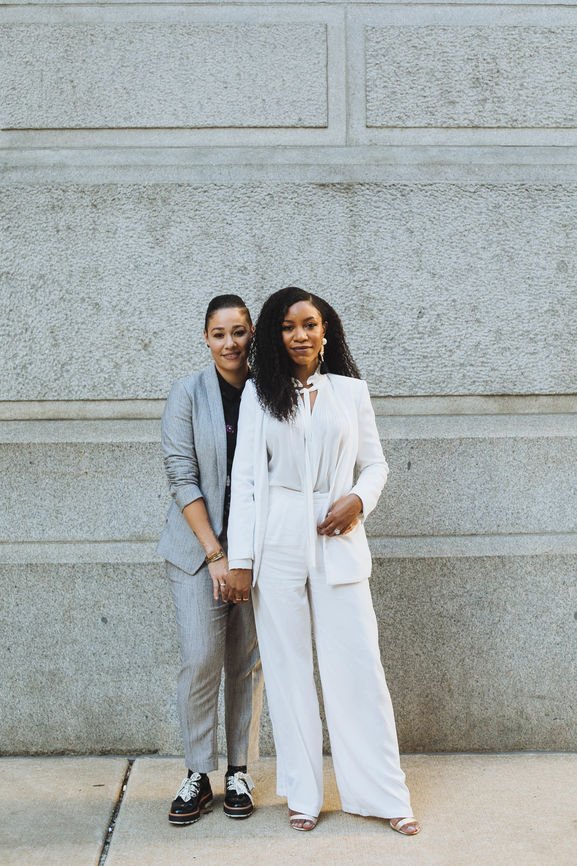
Your Spouse Can Be Your Best Friend (But Maybe Not Your Only One)
Five years ago, my husband was my only friend.
Okay, not quite. We had just moved to Los Angeles, a city in which he had a handful of friends, while I knew no one but him. I had some core long-distance friends who helped ease the transition, but I felt the pang of not having anyone to call up for a quick coffee date.
As we settled in, I worked from home without an easy outlet for meeting people. Meanwhile, my husband spent his workdays in an office full of men who quickly became his friends. By the time he came home, he was often spent from socializing; I, on the other hand, was desperate to dish about my day.
We spent the next two years navigating this dynamic. Me clinging to every second I had him around to talk his ear off, him gently and lovingly encouraging me to get out of the house and socialize. He and his friends became my only friends in the city, us all playing board games and nerding out late into the night over beer, snacks, and YouTube videos. But at the end of the day, I existed in a long stretch of time that I didn’t have “my friends”.
As I found out, putting all that pressure on one person isn’t a sustainable approach to a healthy relationship. So, to ease that burden, I had to shift gears and prioritize my social life.
Why Community Is Essential To Marriage
“By forcing all our social expectations on our spouse, we’re setting ourselves up for failure—and resentment.”
When I finally started making friends in my neighborhood, it was a balm. Having a community allowed me to express my energy outside of his circles and gave my husband space to do the same. I began to realize how dependent I had been, placing him in the role of spouse and “only friend.” I had lost touch with my individual interests and smothered him with the expectation of making me a whole person.
I’m not alone in this expectation.
“We come to one person, and we basically are asking them to give us what once an entire village used to provide,” says therapist Esther Perel about our modern relationship expectations. “Give me belonging, give me identity, give me continuity, but give me transcendence and mystery and all in one.” By forcing all our social expectations on our spouse, we’re setting ourselves up for failure—and resentment.
How can we stop putting so much pressure on our partners? Since technology has removed many of the traditional opportunities for meeting people in real life, it’s easy to spend the majority of our social energy on our spouses. For me, this blurred the line between “best friend” and “only friend,” devolving into a dependency that was not healthy for my relationship. I needed more people to be able to properly connect with just one person.
How To Expand Your Community
Here are ways I’ve worked to build my own community and diversify my “social portfolio” so that my partner doesn’t have to shoulder my social expectations alone.
Meet people, any people. In 2018, The Washington Post reported on how important relationships were to our overall wellbeing. What’s most exciting to me, an introvert who still delights in friendly small talk, is finding that even weak ties help immensely in creating a sense of community. So, chat it up with your barista or strike up a conversation with a fellow commuter—it can go a long way.
Engage more deeply with your coworkers. As I’ve delved further into my career, I find I share less of my day-to-day work life with my husband in favor of big-picture concepts and occasional anecdotes. I mainly keep work at work and rely on my team to discuss strategic vision, tactical approaches, and professional growth. Connecting with your coworkers and building trust adds a level of professional support that a long-term partner can’t fully share. Plus, knowing you have a reliable group of people to solve problems with all day? Heck yes.
Expect more from yourself. Connect with your hobbies on your own terms, and don’t feel the need to partake in them with your partner. (The amount of times my husband has reminded me that it’s fine to spend an evening out or take a yoga class by myself is embarrassing.) Do stuff you want to do, and don’t wait for permission to do it.
Acknowledge underlying mental health possibilities. If you’re struggling with dependency, resentment, loneliness, you name it, maybe it’s time to check in on your mental health. It’s okay to not be okay—which leads to my next point.
Seek out a therapist. Therapy is more common than ever, and seeking it out for yourself and/or your relationship isn’t something to feel shame around. If you’re having difficulty making friends outside of your partnership or experiencing feelings of isolation, talk it out. If therapy is not quite accessible to you, seek affordable options like Open Path or trainee programs. By removing the expectation of “therapist” from your partner, you open up more space to evolve your friendship.
Building a greater social network of people to rely on creates more space for you to connect more intimately with your partner. When you have a solid group of friends, reliable coworkers, helpful doctors and therapists, and a favorite barista or two, you don’t need your partner to fulfill those roles. And when you seek fulfillment beyond the reaches of a relationship, you don’t have to base your wholeness on another person. All you need to do is enjoy the unique best friendship that blossoms in a healthy and balanced long-term partnership.
How do you nurture your social life alongside a long-time partnership? Share in the comments below!
RELATED READING
Emily Torres is the Managing Editor at The Good Trade. She’s a Los Angeles transplant who was born and raised in Indiana, where she studied Creative Writing and Business at Indiana University. You can usually find her reading or writing, caring for her rabbits, or practicing at the yoga studio. Say hi on Instagram!

